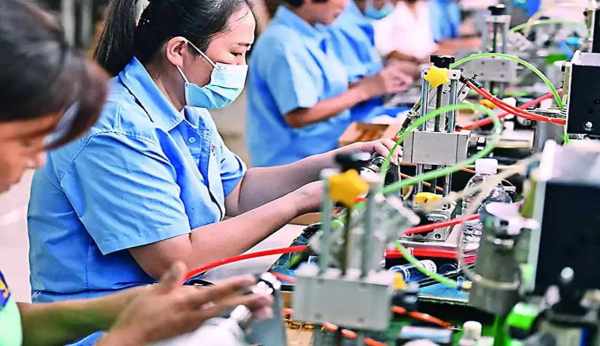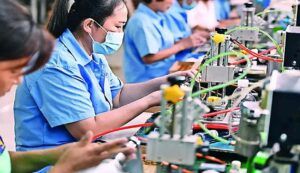
China: According to a factory survey published on Monday, a spike in new orders this month propelled China’s manufacturing sector to its highest growth in a year.

The second-largest economy in the world, which is struggling with growing trade tensions with the US, received some respite from the growth.
According to Reuters, the most recent data indicated that fiscal policies put in place earlier this year are beginning to have an impact on China’s $18 trillion economy.
In addition, overseas purchasers have been scrambling to place purchases before Washington imposes any additional trade restrictions.
In March, China’s manufacturing sector’s official Purchasing Managers’ Index (PMI) reached its highest level since March 2024, rising from 50.2 in February to 50.5 in March.
The figure was in line with predictions made by a Reuters survey. In the meanwhile, the non-manufacturing PMI, which accounts for the construction and service industries, rose from 50.4 to 50.8.
US President Donald Trump is getting ready to impose additional “reciprocal” tariffs on Wednesday, focusing on what he claims are trade imbalances with China, in the midst of these economic developments. The action can increase the already tense commercial ties between the two countries by imposing further taxes on Chinese imports.
Citing Beijing’s insufficient efforts to stop the export of chemicals used in the creation of fentanyl, a deadly narcotic that is causing the opioid problem in the United States, Trump has put cumulative tariffs of 20% on all Chinese imports since taking office again in January.
China has kept its 2025 economic growth goal at “about 5%” in spite of these obstacles.
Beijing has promised more fiscal stimulus, more debt issuance, and more monetary easing to combat trade challenges while highlighting the need to boost domestic demand.
The year got off to a shaky start for China’s economy. Even though there have been indications of recovery in retail sales, persistent deflationary pressures and growing unemployment remain problems.
In a recent meeting with a group of multinational CEOs, Chinese President Xi Jinping urged them to promote global industry and supply chain stability in an effort to increase trust among foreign investors. In the same vein, Premier Li Qiang advocated for further market openness to combat “rising instability and uncertainty” at a prominent business gathering in Beijing earlier this month.
In order to boost domestic spending, Beijing is also extending its “cash for clunkers” consumer goods trade-in program.